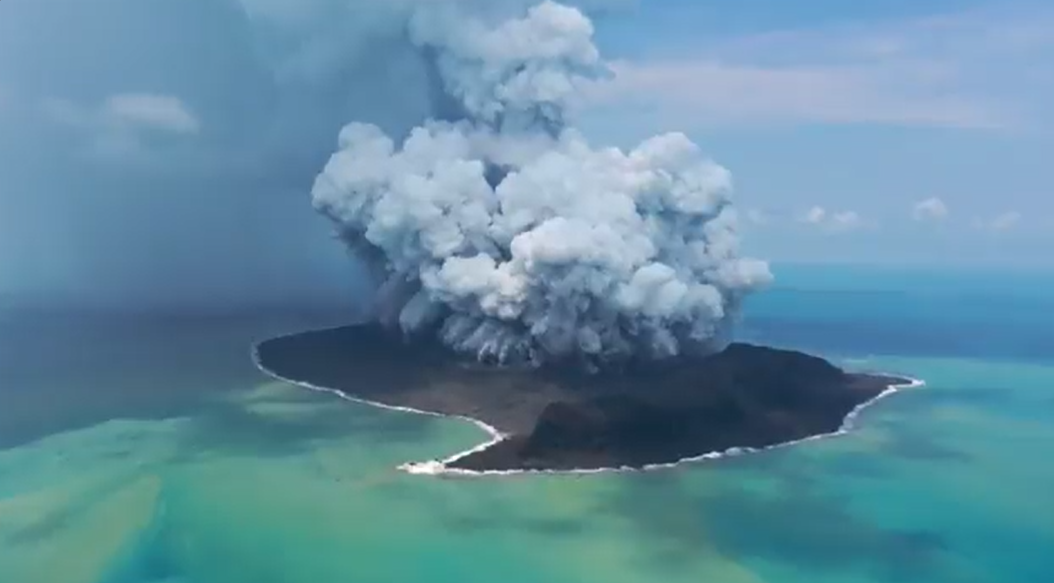Tonga turned into ‘moonscape’ by ash from ‘once-in-millennium’ volcanic eruption
Volcanic ash has left residents unable to drink from their water supply
Your support helps us to tell the story
From reproductive rights to climate change to Big Tech, The Independent is on the ground when the story is developing. Whether it's investigating the financials of Elon Musk's pro-Trump PAC or producing our latest documentary, 'The A Word', which shines a light on the American women fighting for reproductive rights, we know how important it is to parse out the facts from the messaging.
At such a critical moment in US history, we need reporters on the ground. Your donation allows us to keep sending journalists to speak to both sides of the story.
The Independent is trusted by Americans across the entire political spectrum. And unlike many other quality news outlets, we choose not to lock Americans out of our reporting and analysis with paywalls. We believe quality journalism should be available to everyone, paid for by those who can afford it.
Your support makes all the difference.Ash from an underwater volcano has made parts of Tonga resemble “a moonscape”, residents of the Pacific island have said.
Particles emitted by the eruption of the Hunga-Tonga-Hunga-Ha’apai volcano – a “once-in-a-millennium” event – darkened the sky and contaminated the water supply.
Locals have said that the island now looks like the surface of the moon after being coated in a layer of volcanic ash, BBC News reported.
Fresh water is now vital on the island, New Zealand prime minister Jacinda Ardern said, as authorities told the 105,000 residents to only drink bottled water and to wear masks.
New Zealand has sent a plane to Tonga to assess the scale of the damage after satellite images captured the explosion sending plumes of smoke and volcanic ash into the air about 19km (12 miles) above sea level.
Experts say the eruption, which triggered a 7.4 magnitude earthquake, was one of the most violent in the region in decades.

The eruption sparked a tsunami with 1.2m-high waves that have crashed into homes on the coast of Tonga – which lies 2,383km (1,481 miles) northeast of New Zealand – as well as several South Pacific islands.
People have fled low-lying areas in fear that the waves would get bigger, footage posted online shows.
Residents have been cut off from the rest of the world after the vast majority – if not all – the power, internet and telephone lines went down on Saturday at about 1840 local time [0740 GMT].
Some parts of the island are seeing the power restored and some mobile phones were beginning to work again, Ms Ardern said.
But families and friends of those who have not been contactable have become increasingly concerned for their loved-ones’ safety, as casualty reports had yet to come through.
There are no official reports of injuries or deaths as contact has not been established with outlying coastal areas beyond the capital Nuku’alofa and closer to the volcano, Ms Ardern told a news conference.
“Nuku’alofa is covered in thick plumes of volcanic dust but otherwise conditions are calm and stable,” she said.
“There are parts of Tonga where we just don’t know yet... we just haven’t established communication.”

Experts have said that the volcano rarely erupts, but that it can have “several weeks or even years” of “unrest” once it does.
Professor Shane Cronin, from the University of Auckland, said: “This is one of the massive explosions the volcano is capable of producing roughly every thousand years.
“We could be in for several weeks or even years of major volcanic unrest from the Hunga-Tonga-Hunga-Ha’apai volcano.”
Prof Cronin added: “Help will be needed to restore drinking water supplies. People of Tonga must also remain vigilant for further eruptions and especially tsunami with short notice and should avoid low lying areas.”
The event has triggered warnings in a number of countries including the US, where some flooding was seen in California, and Japan.
Powerful waves were also registered in other countries including Australia and New Zealand.
Shockwaves have also been registered by observation sites in the UK, some 16,000km (10,000 miles) away from Tonga, according to the Met Office.
UK Foreign Office minister Zac Goldsmith called the situation in Tonga “shocking” and said Britain stood “ready to help and support our Commonwealth friend and partner in any way we can”.

Join our commenting forum
Join thought-provoking conversations, follow other Independent readers and see their replies
Comments